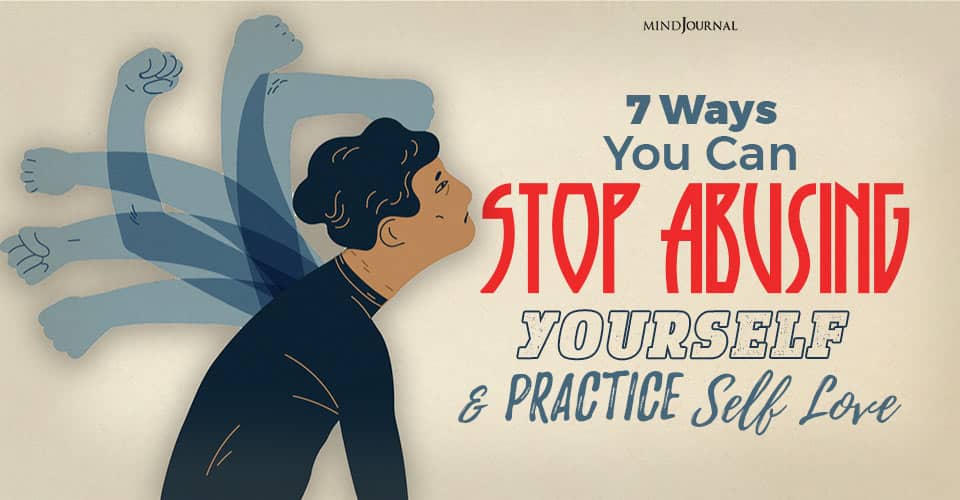Did you know that more than 20% of the global population is in an abusive relationship with a partner or family member? This sounds like a big number until you consider that somewhere around 80% of the world’s population is in an abusive relationship with themselves – and most don’t even know it. This is called self abuse!
The Stranger in the Mirror is You!
The best way to see if you abuse yourself is to imagine that someone else is treating you the way you treat yourself. How would you feel if …
Your friend spoke to you, the way you speak to yourself?
Your significant other neglected you, the way you neglect yourself?
Your co-worker judged you, the way you judge yourself?
In most cases, if others treated us the way we treat ourselves, we would feel abused, and we would be right. If it’s not okay for others to treat us abusively, why is it okay to treat ourselves this way?
Maybe it doesn’t seem like a big deal, but trust me, it really, really is!
The harm we unconsciously do to ourselves manifests as issues, challenges, and missed opportunities, and when self abuse goes on day after day, sooner or later, it shows up in our health and finances.
But, why do we abuse or neglect ourselves?
Related: 4 Kinds Of Self-Criticism You Must Put An End To
Understanding Self Abuse
Self abuse is the natural consequence of withholding self love because when we don’t love ourselves, we instinctually don’t treat ourselves well, but what prevents self love?
The reason why so many of us have huge blocks when it comes to self love is due to the fact that we have been falsely taught that we must prove our worth, over and over again, before we are worthy of love. This dynamic causes most people to go through their lives secretly feeling unworthy, and, therefore, withholding self love.
If you don’t remember that you are unconditionally worthy of love, you are not going to treat yourself lovingly and you won’t believe in yourself, and this ultimately results in habitual self-judgment.
When you are in an abusive relationship with yourself, it most often shows up in the way you speak with yourself, inevitably causing you to fill your mind with toxic negative thinking, while, at the same time, dismissing inner guidance and undermining telltale emotions.

Abuse or neglect encompasses anything that compromises your needs or sacrifices your integrity, including surrounding yourself with negativity and depriving yourself of joy and peace.
The combination of chronic self-judgment and the withholding of self love is abusive in itself but it also sets the stage for other types of abuse, and, oftentimes, other people demonstrate our lack of self love and self-respect by abusing us, as well. More often than not, when we are self-abusive, we put ourselves in compromising positions, we don’t stand up for ourselves and we associate with negative people who cross our non-existent boundaries.
But, no matter how it seems, the problem is not with anyone else. Since no one can ever abuse you worse than you are secretly abusing yourself, the ways in which others treat you are blatant indicators. Hence, to put an end to external abuse, you must stop doing to yourself what others are doing to you. Indeed, self abuse shows up in our relationships, but it also adversely impacts every area of our lives.
Related: 6 Ways To Protect Yourself From Destructive Criticism
What’s so important about treating yourself well?
Is there anything that you would like to change in your life or attract to you – greater health, wealth, or love, for instance? Well, in order to be, do or have what you desire, you must believe that you are worthy of it.
The Universe is not determining your worthiness because to the Universe you are unconditionally worthy of all you desire. It is you who decides your worth, thereby determining what you get and don’t get, and, as a result, the Universe delivers according to your assessment. But, unfortunately, you cannot fool the Universe by saying that you deserve wealth, health, or love and then demonstrating unworthiness by the way you treat yourself.
You can say that you are worthy of the perfect partner, more abundance, or even that snazzy figamagig until you are blue in the face, but the truth of the matter is revealed in the relationship you have with yourself. You cannot say that you are worthy of abundance in a morning affirmation and then spend the rest of the day withholding love from yourself as you engage in self-judgment.
People who know their unconditional worth simply do not judge, criticize or disrespect themselves; they don’t neglect themselves, they don’t put everyone’s needs before their own and they don’t disregard their feelings or inner guidance. You can’t do these things on a regular basis and at the same time successfully convince the Universe that you believe that you are worthy of what you desire.
If you believe that you are worthy of manifesting your dreams, it will undoubtedly show up in the way you treat yourself, and in the amount of self love that you express and experience.
Think of self love like a currency that you exchange for manifestation. The more you love yourself, own your worth, and believe in yourself, the more energy you have to exchange for the things you desire.
The Root of Self Abuse
Most of us subject ourselves to verbal and emotional abuse all day long and don’t even realize it. Chronic self-judgment manifests as undermining your gifts and abilities and inevitably results in destructive self-doubt and disempowerment. Every time you put yourself down, you run the risk of suppressing your truth, and when you don’t trust yourself, you inhibit intuition that could otherwise guide your path.
Your thoughts and words act as commands to your subconscious mind, and, therefore, how you speak to and about yourself on a consistent basis directly impacts the quality of your life.
When you think about yourself negatively, your subconscious interprets it as a command and then systematically aligns you with opportunities that will prove your command to be true.
So, if you think that you are clumsy, for example, your subconscious mind will line you up with situations where you will be clumsy, or, if you believe that you are not deserving of self-care, your subconscious will cause you to feel guilty for thinking of yourself, while also keeping you busy and projecting obstacles that keep you from focusing on yourself.
The way you speak to yourself entrains your subconscious mind to take appropriate action, and, therefore, your behavior will always reflect your thoughts and beliefs. What we believe about ourselves is the unconscious basis for how we automatically treat ourselves and how others treat us as well.
The entire world is a feedback system specially designed to demonstrate your beliefs. Life isn’t saying that your beliefs are true, as no beliefs are absolutely true – life is simply reflecting your inner world on the canvas of your life. Therefore, if you like what life is showing you, you’ve got positive and empowering beliefs, but if you don’t like what life is showing you, it’s time to develop better beliefs.
If you are, in fact, in an abusive relationship with yourself, your beliefs are the root cause. Since beliefs always manifest as thoughts, by consistently replacing negative thoughts with their positive counterpart, you have the ability to change your most pivotal beliefs.
Whether you know it or not, you are the sole commander of your life, and you decide the course that you will take, but, if you have been an unconscious commander, chances are that you have indulged in negative commands that focus on the opposite of what you really desire, thereby casting you in the wrong direction.
Additionally, when you constantly criticize your body, your body takes it as a command and manifests your criticisms. If you want to lose weight, and you tell your body that it is fat and out of shape, your body will respond obediently to your command, by preventing weight loss or you might even gain weight.
After all, you can’t tell your body it’s fat and ugly and expect it to be thin and beautiful. Take a moment and think about the most frequent commands you give your body, and, if they are not in alignment with what you desire, it is imperative to change them. If you speak to your body, as if it is the body of a God or Goddess, you will begin to manifest the body of a God or Goddess.
Related: 10 Steps For Practicing Self Love
Practice Isn’t Perfect
There was no class in school that taught us how to relate to ourselves or how to treat ourselves, so we learned how to treat ourselves by modeling how our parents treated us and also by mirroring how they treated themselves, so if a parent was self-critical or neglectful of his/her personal needs, you probably learned to do the same.
For most of us, this means that self love did not come naturally, and, therefore, we must learn to love ourselves. And, as we do, we must consistently practice self love, because if you are not consciously practicing self love, you are unconsciously practicing self abuse.
It is said that practice makes perfect, but you don’t need to be perfect to overthrow self-abusive tendencies. Just by practicing loving acts of kindness toward yourself, one step at a time, you will learn how to love yourself and your life will improve immeasurably.
Here Are The Top 7 Ways To Practice Self Love
1. Speak Kindly
Replace self-judgment with positive and encouraging self-talk. Speak to yourself like you want others to speak to you. Be your own best friend!

2. Boundaries
Stand up for yourself and don’t be afraid to set and enforce boundaries that teach others how to treat you.
3. Nurture Yourself
We are taught that self-care is selfish and that others must come first, but this is simply not true and never was. Self love and self-care are the absolute foundation of your life, and if you don’t properly care for yourself, no one else will. Your primary job is to nurture yourself, and then when you are full and overflowing, you will have the energy and inspiration to support others, if need be.
Self-nurturing requires that you give yourself much more than basic human needs: high-quality nutrition, excellent hydration, adequate sleep, and time for play and rejuvenation each and every day.
Related: 5 Things That Are Self Care And 5 Things That Are Not
4. Expression
Speak your truth, express your gifts, experiment with your talents, do what you love to do and have fun simply for the sake of having fun!
5. Emotional Needs
Meet your own emotional needs by generously giving yourself approval, acceptance, understanding, respect, appreciation, etc… You can never be too good to yourself.
6. Listen to Guidance
Your wise inner being has all the answers you are seeking, but you must go within and consult on a regular basis. As you learn to listen through meditation or mindfulness, your intuition will grow and bring clarity. Moreover, your body contains infinite wisdom and the more you listen to its feedback and respect its guidance, the healthier you will become.
7. Treat Yourself Like Royalty
If you were to host a beloved prince in your home, how would you speak with him and how would you honor and respect him? Let this be a template for how to treat yourself. We think it is normal to mistreat ourselves, but it’s not. We think that the way we treat ourselves has no impact on our lives, but it does.
The Key is Choosing to Believe in Yourself!

The way you relate to yourself is always in direct proportion to your beliefs about yourself, so if you don’t believe in yourself, or if your beliefs revolve around disempowerment or unworthiness, your actions, reactions, and behavior will reflect accordingly.
You could accurately say that self love is the result of believing in yourself, and, in fact, believing in yourself is the key to success in all ways, because when you believe in yourself, you command your subconscious mind to succeed. But, how do you believe in yourself if you were never taught to do so, and, especially if you have spent a lifetime practicing self-doubt and not believing in yourself?
Related: 12 Ways To Improve Emotional Intelligence Through Self Care
It’s a choice!
Right now, without the need for proof, validation or permission, you have the power to believe in yourself, simply because you choose to! In choosing to believe in yourself, you must finally claim your unconditional worth and you must consciously commit to changing your thoughts in order to support this new choice.
You can absolutely master your mind, but you must consistently practice empowered thinking day after day. At first, it may be challenging, but, sooner or later, it will become easier until you have re-programmed your mind, and it is effortless to think good thoughts about yourself, and when this happens, life will transform by demonstrating your positive and empowering beliefs back to you.
This is the ultimate space of self love where life flows with ease and grace and all your dreams can effortlessly manifest.
Written by Nanice Ellis Originally appeared on Nanice Republished with permission










Leave a Reply